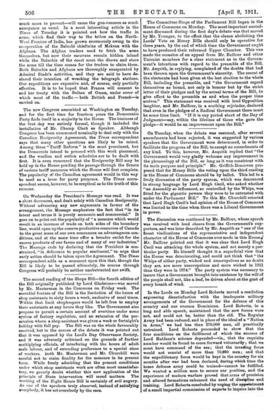The Committee Stage of the Parliament Bill began in the
House of Commons on Monday. The most important amend- ment discussed during the first day's debate was that moved by Mr. Younger, to the effect that the clause abolishing the Lords' Veto on Money Bills should only be operative for three years, by the end of which time the Government ought to have produced their reformed Upper Chamber. This was made the occasion of an appeal from Mr. Balfour and other Unionist members for a clear statement as to the Govern- ment's intentions with regard to the preamble of the Bill. Mr. Asquith, in replying, complained of the doubts that had been thrown upon the Government's sincerity. The assent of the electorate had been given at the last election to the whole Bill, including the preamble, and " the Government regard themselves as bound, not only in honour but by the strict letter of their pledges and by the actual terms of the Bill, to give effect to the preamble as and when the proper time arrives." This statement was received with loud Opposition laughter, and Mr. Balfour, in a scathing rejoinder, declared that even in the pledges of a Radical Government there must be some time limit. " If it is any period short of the Day of Judgment—say, within the lifetime of those who gave the pledge—it would be an improvement upon the Bill."










































 Previous page
Previous page